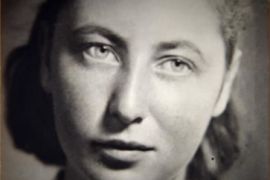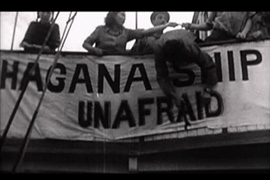Israeli voices: Tamar Eshel
The granddaughter of pioneers, Eshel served in the British army and the Haganah.

 |
Tamar Eshel’s Russian grandparents migrated to Israel in 1882 with dreams of establishing a modern Jewish society based on Hebrew and agriculture.
“In 1936 the problems started. I remember the year very well because I was, by then, a young member of the Haganah, which was the paramilitary force of the Jewish population in Palestine.
The aim of the organisation was to be ready to defend the Jewish population of Palestine against any aggression.
| The Promised Land? |
We felt that they [the British] were pro-Arab and we could not trust them. We could not buy land, they narrowed immigration, they employed mostly Arabs in their administration, the Arabs didn’t pay income tax and rates and whatever we paid went mostly to them.
So, eventually we set up a separate educational system because we saw we couldn’t get anything from them and, in fact, it was a blessing because when we created the state it had the shadow government with all its necessary branches in the making.
Our war
You know what Mr Ben Gurion said was a very wise thing: “We will fight the Nazis as if there is no White paper and we will fight the White paper as if there is no Nazis”.
So we volunteered to fight in the British army. This was quite a difficult decision for people who were constantly anti-British, saw the British as enemies and all of a sudden I am going to be a member of the British army.
We were 4,000 women by that time and 35,000 all together which was an enormous percentage of barely half a million people. But we did it well-heartedly because we felt that this war is ours no less, if not more than, the other people.
[Later] I became an officer in charge of political and military intelligence for Haganah in Jerusalem. I was in charge of the intelligence work of the United Nations Special Committee on Palestine which arrived here in 1947.
[When the creation of the state was declared] I was in the south of France working on what we called illegal immigration and I sent people here in very special line so that they will not be caught by the British and sent to Cyprus, so I was not in the country on May 14.
 |
| A Haganah ship taking refugees from Europe to Israel |
I’ll never forgive anybody for that. I was so busy sending 1,000 people to this country that when they proclaimed the establishment of Israel on Friday the 14th, I couldn’t raise a glass in honour of the new state that we were dreaming of and fighting for until Sunday night because I was too busy on sending 1,000 people to the new state.
They were mostly refugees from camps who had survived the war.
Young people and with quite a few of the orphans that were found all over Eastern Europe and were gathered in special orphanages in France and we added them to these people when they had common language, say Hungarian or Polish or German – whatever it was – so that the children would be able to be sent with them. It was a very complicated operation.
It was a very rewarding thing that you knew that you were saving people.
I remember two boys that we could not send because of some technical difficulty and they lay under the wheels of enormous lorries that were taking people to the port.
They would not allow anybody to leave the camp unless they [went too] – to join the fighting. They wanted to get to the true homeland.
Cousins
I believe there is a great deal common between us and the Arabs. I was for many years at the United Nations and I won’t say what countries I got long with and what I did not, but I always knew and I always prayed that we will have peace with the Arab world, and I will get on with the Arab countries better than others.
And there is no question we are cousins. We have lots in common.
But, I think if all this animosity were not fanned today by extreme religious feelings, which never existed before, a lot of the problems would have been solved.
Because we can solve the problems if these extraneous elements were not present. And this is something that the Arab world has to fight with. We can not solve the problem.
I’ll tell you there is a form of extreme Judaism, but they are not influential enough, they are not, and they are not at the top and not the ones who lead the country, while in the Arab world they are the ones who lead the country, and that is the lack of symmetry.
I’m sure that will be solved. When it comes to boundaries, it will be solved.“
